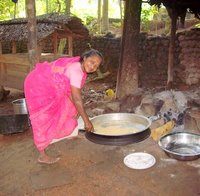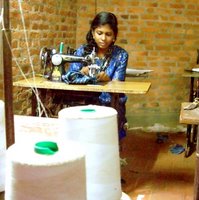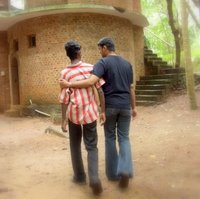Mitraniketan - Home of Friends

'Mi-tran-i-ketan'
translated: 'Home of Friends'

Where are Brian and Brenda Luzader now?
Dangling from the ceiling of a local bus and pressed tightly into a crowd of sweating bodies we looked at each other with despair, wondering why we ever left the comforts of home for this? Surrendering to gravity, we fell against strangers, as the rusty bus carved us deeper into the hills of Kerala. When at last it reached its destination we were pushed out and deposited in a dirt field. Feeling further away from home and even more removed from friends and family we loaded ourselves into a rickshaw and headed to our new home for a good part of the next few months.
I remember on that day, tears that burst from a tired traveller's eyes. Seven months away, had made me feel completely displaced, and I longed for everyone and everything familiar at home. I stared vacantly at a dirty brick room with a flickering bulb, and an unsolicited family of cockroaches for room mates. Dropping my backpack to the floor in exasperation, I fell to a hard musty bed crying out to go home.

I didn't know it then, but later realized that my appeal was answered. Mitraniketan had brought instead, a sense of home to us. We had arrived at a rural education campus that supported the needs of 400 poor, tribal, lower caste and women students. Over the next two months we came to find our place among this new family. It was our job to understand the needs of these students, the goals of the organisation and the struggles of the staff. We all came to know our roles and responsibilities to each other while living as a community in rural India.


Brian and I were put to the task of designing, and writing a book about the institution and its activities. The pupose of this book was to educate, share unique teachings and bring international support to the organisation. We studied their culture, beliefs and educational methods. Then photographed, interviewed and compiled a 20 page booklet about the importance of holistic development in an educational institution. We lived with, worked, played, and befriended hundreds of students and staff who all made this part of India feel like our home as well.



What is Mitraniketan and what makes it special?
Mitraniketan is a residential campus that teaches 'education for life.' It is supported by volunteers and well wishers from India and abroad. The target group for the school/college is rural children and youth from the poorest sectors and lowest castes of society. In effort to reverse the ill effects that culture has had on females, women applicants are given priority. Those that have the opportunity to attend Mitraniketan are then housed, fed, clothed and educated throughout the year. It is their goal to develop students who can find/make work for themselves in rural areas without having to migrate to the cities.


What makes this school different, is that the teaching methods are non-formal. Based on ideas from the Danish Folk High Schools, the teaching is meant to be transparent, in discussion and on equal footing with students. At the 'People's College' their are no tests, instead students are given evaluations and opportunities to question the subject and its validity to their future.
 More importantly Mitraniketan works to motivate and equip rural youth to become an active and creative factor in their family, and community. This approach seeks not merely to route students into the work force, rather strives to provide students with a chance to realize their full potential as individuals and to gain a sense of their connection and responsibility to others. The idea behind this form of education is that learning only becomes a significant part of our lives if we are actively involved and share responsibility for it.
More importantly Mitraniketan works to motivate and equip rural youth to become an active and creative factor in their family, and community. This approach seeks not merely to route students into the work force, rather strives to provide students with a chance to realize their full potential as individuals and to gain a sense of their connection and responsibility to others. The idea behind this form of education is that learning only becomes a significant part of our lives if we are actively involved and share responsibility for it.
What's it like on the Mitraniketan campus?
The facility is located on sixty acres of tropical forest donated by the founder himself. Students wake early to do yoga and sports, then each school day starts with a song at morning assembly. An open stadium fills with a chorus of voices inspiring one other to work hard and believe in a better future. Like an open forum, opportunity is given to discuss news, give recognition to students or bring up concerns in the community.


After a closing song, students disperse to outdoor classrooms where they gather to learn about practical knowledge focusing on need-based skills. While the primary and high schools work on basic education, the college students are offered carpentry, food processing, tailoring, computers, agriculture and various other livelihood skills.

The campus bustles daily with activities in education, farming, artisan trades, culture, dance, sport, and homemaking. Students help to prepare food, clean and participate in the maintenance of the grounds. Dignity of labor is enforced so that each student will emerge respecting all castes and occupations in society. Evenings close with a quiet humm of study time in the library, club meetings, news reviews, or occasional dance performances.
What did we learn from our stay at Mitraniketan?
Many people come to India just to be enlightened, inspired or re-directed in life. We gained the same by simply sitting across a dinner table from the director of Mitraniketan each day. This man has shared with us his strength and wisdom. He has inspired us to believe in individuals bringing about change starting with the community and extending across the world. For fifty years he has led by example, struggling to provide equal opportunity, empowering women, strengthening rural areas, educating and offering humanity and compassion to the poorest and lower caste sectors. Living with this community has restored our faith in India and its role in a developing world.
To the man who has created for us and many more, a real 'Home of Friends' we respect and admire his great works.
“In today’s world of transition, we must examine how we approach the concept of development and re-orient our approach and methods in such a way as to put humaneness back into the equation.
Our primary task in this re-orientation is the enablement of people; development will come about only when individuals as a part of family and community are reminded of their own power in determining the circumstances of their own lives.”
Founder of Mitraniketan -K Viswanathan

You can learn more about Mitraniketan at
www.mitraniketan.org.in (if site is not up already, it's coming soon)
Labels: India







